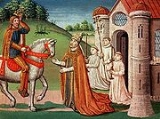
Charles
WordNet
noun
(1) A river in eastern Massachusetts that empties into Boston Harbor and that separates Cambridge from Boston
(2) King of the Franks and Holy Roman Emperor; conqueror of the Lombards and Saxons (742-814)
(3) French physicist and author of Charles's law which anticipated Gay-Lussac's law (1746-1823)
(4) The eldest son of Elizabeth II and heir to the English throne (born in 1948)
(5) Son of James I who was King of England and Scotland and Ireland; was deposed and executed by Oliver Cromwell (1600-1649)
(6) King of England and Scotland and Ireland during the Restoration (1630-1685)
(7) As Charles II he was Holy Roman Emperor and as Charles I he was king of France (823-877)
(8) King of France who began his reign with most of northern France under English control; after the intervention of Jeanne d'Arc the French were able to defeat the English and end the Hundred Years' War (1403-1461)
(9) King of France from 1560 to 1574 whose reign was dominated by his mother Catherine de Medicis (1550-1574)
WiktionaryText
Etymology
From the French Charles, from the German Karl, from the root karal, meaning person, free man; compare the English word churl and the German Kerl.
Proper noun
Related terms
- diminutives: Charley, Charlie, Chuck, Chas.
- variants: Carl, Carroll, Karl
- feminine forms: Carla, Carly, Carol, Carole, Carolina, Caroline, Carrie, Charlene, Charlotte, Lottie
Quotations
- 1599 William Shakespeare, King Henry V, Act I, Scene II:
- Charles the Great / Subdued the Saxons, and did seat the French / Beyond the river Sala, in the year / Eight hundred five.
- 1844 Edgar Allan Poe: Thou Art the Man:
- - - - there never was any person named Charles who was not an open, manly, honest, good-natured, and frank-hearted fellow, with a rich, clear, voice, that did you good to hear it, and an eye that looked at you always straight at the face, as much as to say: "I have a clear conscience myself, am afraid of no man, and am altogether above doing a mean action." And thus all the hearty, careless,'walking gentlemen' of the stage are very certain to be called Charles. ( Note: Charles turns out to be the villain of this story.)
- 1988 Ed McBain: The House That Jack Built: page 212:
- - - - spoke the way the English do, funny, you know? His name was Roger, I think. Or Nigel. Something like that." / "How about Charles?" / "Charles? Well, yes, it could have been.Charles does sound English, doesn't it? Their prince is named Charles, isn't he?"
Proper noun
Charles
- , cognate to English Charles

